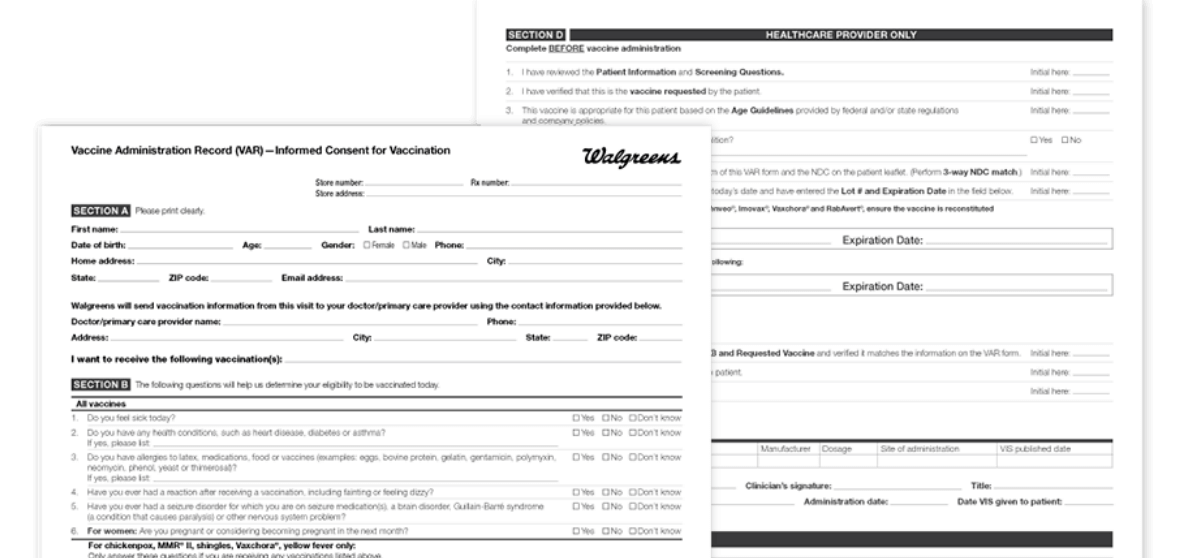Walgreens Concord Ca Chicken and Roce Baby Food

*No cost to you with most insurance. Vaccines subject to availability. State-, age- and health-related restrictions may apply.
Save a trip—get your flu shot and other recommended vaccines in one visit. Talk to your local pharmacist to learn more. To schedule a flu shot appointment by phone, call your local pharmacy or 1-800-WALGREENS (1-800-925-4733).

We offer flu shots to anyone ages 3+
Getting a flu shot is an easy way to help protect you and your family. Our dedicated pharmacists know which flu shot is right for you based on your age and health history.

Bring your insurance information and complete the assessment/consent form in advance to save time.
Print vaccine consent form:
Earn $5 Walgreens Cash rewards on your next in-store purchase of $20+ for every vaccine you get at Walgreens1

Get a Shot. Give a Shot.®
We're helping provide 100 million lifesaving vaccines to children in need around the world by 2024.
When you get your flu shot, you help provide a lifesaving vaccine to a child in need.
Expert insights
Important flu information from scientists, healthcare professionals and pharmacists to help you stay informed.
Frequently Asked Questions
Get answers to your questions about the flu
- What is the flu?
The flu (influenza) is a contagious respiratory illness caused by influenza viruses. It can cause mild to severe illness, and at times can lead to death. The flu is different from a cold. The flu usually comes on suddenly. People who have the flu often experience fever, chills, cough, sore throat, runny or stuffy nose, muscle or body aches, headaches and fatigue (tiredness). Some people may have vomiting and diarrhea, though this is more common in children than adults.
Some people, such as people ages 65+, young children and those with certain health conditions, are at high risk for serious flu complications. The best way to prevent the flu is by getting vaccinated each year with a flu shot.
- What is the flu shot?
The "flu shot" is a vaccine that protects you from the flu virus. It is inactivated, which means it contains a killed version of the virus which cannot cause disease and is most commonly given as an injection (with a needle) in the arm.
This season's vaccine protects against three or four influenza viruses that research indicates will be most common during the season. This includes an influenza A (H1N1) virus, an influenza A (H3N2) virus and 1 or 2 influenza B viruses.
The vaccine takes effect approximately two weeks after it has been administered as antibodies (substances in the blood that protect against infection) accumulate and provide protection against influenza. Therefore, it is important to get a flu shot before the flu begins to circulate in your area as you may be susceptible to influenza during the two weeks after your flu shot.
The flu shot will not 100% eliminate the risk of getting the flu as there are several strains of viruses that can cause the flu. However, data suggests flu symptoms may be milder and complications can be reduced following vaccination. It can also protect others who are vulnerable but may not be able to receive the vaccine for a variety of reasons.
To learn more about flu shots from the CDC, visit the CDC website opens a page in new tab or download the following documents:
Influenza (Live, Intranasal) (PDF) opens a page in new tab
Influenza (Inactivated) (PDF) ) opens a page in new tab
- Who should get a flu shot?
The CDC recommends everyone ages 6 months and older get a flu shot every flu season, including those are who healthy or have health conditions. Walgreens offers flu shots to anyone ages 3+. It's recommended that anyone who wants to reduce their chances of getting the flu should be vaccinated. It's especially important for certain people to get vaccinated, such as those who are at high risk of developing serious complications like pneumonia if they get sick with the flu. This includes:
- People who have certain medical conditions including asthma, weakened immune systems, diabetes and chronic heart or lung disease
- Pregnant women
- People ages 65+
- People who live with or care for others who are at high risk for developing serious complications. This includes household contacts and caregivers of people with certain medical conditions including asthma, diabetes, chronic lung disease, and others.
- According to CDC analysis opens a page in new tab of flu hospitalization data, people from certain racial and ethnic minority groups, including non-Hispanic Black, non-Hispanic American Indian or Alaska Native, and Hispanic or Latino people
- Who should not get a flu shot?
The flu shot should not be given to:
- Children younger than 6 months of age
- People with severe, life-threatening allergies to the flu shot or any ingredient in the vaccine. This might include gelatin, antibiotics, or other ingredients.
Certain individuals should not be vaccinated without first consulting a healthcare professional. These patients include:
- People who have an allergy to eggs or any of the ingredients in the vaccine
- People who had Guillain-Barré Syndrome (a severe paralyzing illness, also called GBS) within six weeks of getting the flu vaccine previously
- People who have a moderate or severe illness with a fever, including those with COVID-19, should wait until they recover before getting a flu shot
- Is there a flu shot for ages 65+?
Adults ages 65+ have a higher risk for developing complications from the flu and account for more than 60% of the flu-related hospitalizations each year. Recent studies show that people ages 65+ may not respond as well to standard-dose flu shots because they do not produce as high of an antibody response following vaccination as do younger people. People with low antibody levels may be at higher risk of catching the flu.
While adults ages 65+ may receive a standard flu shot, there are vaccines, such as Fluzone High-Dose and FLUAD, designed specifically for patients ages 65+ that work by improving the production of antibodies in order to provide a stronger immune response to the flu than traditional vaccines. Like the standard flu shot, these vaccines are given as an injection in the arm and the side effects are similar, though some patients may experience increased pain, redness, or swelling around the injection site compared to standard-dose flu vaccines.
- When should I get the flu shot?
The CDC recommends that people get the flu shot as soon as it becomes available and before the flu is widespread by late fall. The peak season is typically October to March in the U.S. but people should receive their vaccine as long as the virus is circulating. People should get their flu shot every flu season to ensure the best protection from the flu for themselves and others.
- What are the common side effects of the flu shot?
The viruses in the flu shot are killed (inactivated), so you cannot get the flu from a flu shot. Some minor side effects that could occur are:
- Soreness, redness, or swelling where the shot was given
- Fever (low grade)
- Aches
If these side effects occur, they begin soon after the shot and usually last 1 to 2 days. Over the counter products may be recommended to manage minor side effects. Most people who receive influenza vaccine have no serious problems from it.
- How do I schedule a flu shot appointment?
Schedule a flu appointment online at your convenience through Walgreens.com or using the Walgreens mobile app. To schedule an appointment by phone, call your local pharmacy or 1-800-WALGREENS (1-800-925-4733).
- Do all Walgreens stores administer flu shots?
All Walgreens retail locations administer the flu shot and other routine vaccines for shingles, pneumonia, whooping cough and COVID-19.
View all immunizations › - Who administers the flu shot at Walgreens?
Our licensed pharmacists, pharmacy interns and trained technicians administer flu shots in all Walgreens pharmacies. Visit your local Walgreens to speak with a pharmacist and to get your flu shot today.
- What safety measures will Walgreens be taking when administering vaccinations?
Immunizers wear disposable surgical masks and face shields while administering vaccinations. Patients are required to wear face covers while receiving their shot.
- Is my flu shot covered by insurance at Walgreens?
Flu shots are available at Walgreens at no cost with most insurance.
- Can I get a flu shot and COVID-19 vaccine at the same time?
Yes. Your flu shot can be administered alongside your COVID-19 vaccine during the same visit. Talk to your local Walgreens pharmacist if you have questions or concerns about getting the flu shot and COVID-19 vaccine together.
- Why is it important to get a flu shot during the COVID-19 pandemic?
The flu and COVID-19 are both contagious infections caused by different viruses that spread through respiratory droplets. They can cause mild to severe illnesses and similar symptoms, including fever, cough, body aches and fatigue, which are sometimes difficult to distinguish due to their similarities. During the COVID-19 pandemic, it is more important than ever to get vaccinated for the flu and COVID-19 to prevent severe illness, including hospitalization and/or death. Getting vaccinated not only protects you but also those around you.
Looking for more?
References
Centers for Disease Control and Prevention (CDC). Seasonal Flu: Preventative Steps. November 13, 2018. https://www.cdc.gov/flu/consumer/prevention.htm. Accessed July 2019.
Hamborsky J, Kroger A, Wolfe S, eds. Centers for Disease Control and Prevention (CDC).Epidemiology and Prevention of Vaccine-Preventable Diseases. 13th ed. Washington, DC: Public Health Foundation, 2015.
Vaccine Information Statement: Influenza Vaccine (Inactivated). Centers for Disease Control and Prevention (CDC). August 7, 2015. https://www.cdc.gov/vaccines/hcp/vis/vis-statements/flu.pdf. Accessed June 2016.
Vaccine Information Statement: Influenza Vaccine (Live, Intranasal). Centers for Disease Control and Prevention (CDC). August 7, 2015. https://www.cdc.gov/vaccines/hcp/vis/vis-statements/flulive.pdf. Accessed June 2016.
This publication should be used for general educational purposes only and is not intended to be a substitute for professional medical advice. Although it is intended to be accurate, neither Walgreen Co., its subsidiaries or affiliates, nor any other party assumes liability for loss or damage due to reliance on this publication.
1 Coupon offer not valid in AR, NJ, or NY. Limit 1 storewide coupon redeemed per transaction. Must be a myWalgreens™ member. Walgreens Cash rewards are not legal tender. No cash back. Walgreens Cash rewards earned on this transaction good on future purchases and not eligible for redemption in the same transaction. Valid in store only with coupon. Purchase requirement must be met in a single transaction, before taxes and after discounts, store credit and redemption dollars have been applied. Void if copied or transferred. Rewards cannot be earned on photo orders not picked up in store, alcohol, dairy, tobacco, gift cards, clinic services, prescriptions, pharmacy items or services, sales tax and items or services sold by third-party partners. Other exclusions apply. Complete details at myWalgreens.com.
Walgreens Concord Ca Chicken and Roce Baby Food
Source: https://www.walgreens.com/topic/pharmacy/seasonal-flu.jsp
0 Response to "Walgreens Concord Ca Chicken and Roce Baby Food"
Post a Comment